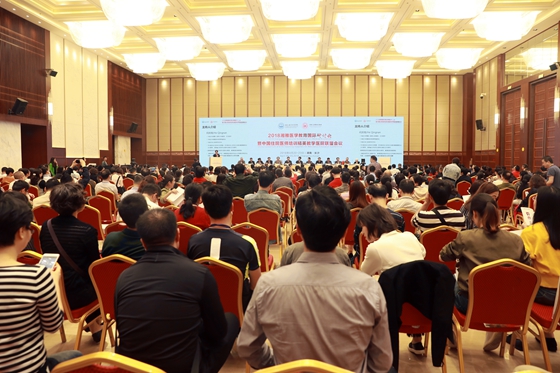On Apr. 21, the “2018 Xiangya International Medical Education Symposium” was convened in Changsha, Hunan Province. It was hosted by the Xiangya Medical School of the Central South University (CSU) and jointly undertaken by the Xiangya Hospital, the Second and the Third Xiangya Hospitals of CSU. Leaders of CSU including Tao Lijian, Chen Xiang, etc. were present at the opening ceremony and the forum.
The two-day Symposium included a main forum, three sub-forums and more than 20 workshops. Educational experts invited from Harvard University, University of Pittsburgh, Cornell Medical College, Mayo Medical Center, Sengkang General Hospital (Singapore), Hong Kong University, Peking University, Sun Yat-Sen University, Huazhong University of Science and Technology, Shanghai Jiaotong University, Sichuan University, Fudan University, Wuhan University and other well-known foreign and domestic universities and institutions delivered keynote speeches on relevant topics of medical education, discussed on the reform and development of medical education. It dealt with such issues as medical undergraduate and postgraduate education, standardized training of resident physicians, and medical simulation education. More than 600 clinical and teaching staff from more than 50 foreign and domestic medical schools attended the Symposium.

As to the topic of medical education reform, Deputy Director of the Department of Higher Education of the Ministry of Education Wang Qiming, Deputy Director with Peking University Health Science Center Prof. Wang Weimin, and Prof. Judith Palfrey with Havard Medical School gave lectures on the development history and the future development direction of medical education in China and foreign countries. They pointed out that the new age requires a new medical education centering on the cultivation of innovative talents in an age of artificial intelligence.
As to the topic of teaching staff construction and innovative talent cultivation, the experts from Chinese Mainland, the US and Chinese Hong Kong respectively shared their experiences according to the practical situation. Deputy Secretary of the CSU Party Committee Tao Lijian noted that currently there are few studies on the special laws of medical education in universities; and that medical schools do not know enough about the laws of administering universities. Universities should follow the law of medical education in light of the respect for the law of higher education to further optimize and reform the internal management systems; more attention should be paid to balancing teaching organization, teaching resources and teaching effects, thus to cultivate high quality medical talents. At the same time, it is important to learn from international experience and give full play to their own advantages, so that China may create its own medical education with Chinese characteristics. Mark Swartz ofthe Clinical Skills Training Center (New York) believed that a teacher of medical education should encourage students to rethink when they make a diagnosis so as to avoidbiasing critical thinking. Prof. N. G. Patil of Hong Kong University set forth based on the experiences of local hospitals the courses for education and training of undergraduates and resident physicians.
As to the topic of simulated teaching, Prof. Richard B. Schwartz of the Medical College of Georgia at Augusta University, Prof. Paul Phrampus of Peter M. Winter Institute for Simulation Education and Research (WISER) Center of the University of Pittsburgh, Prof. Sabrina Koh of Sengkang General Hospital, Prof. Dong Yue of Mayo Medical Center and other experts and scholars made a detailed presentation and introduction to the application and development of simulated medical education, and shared internationally advanced experiences in simulated medical education.
On the Presidents Forum, an active discussion was extended to the development road for medical education of comprehensive universities in the context of “Double First-Class Construction” among Sun Yat-Sen University, Central South University, Huazhong University of Science and Technology and Peking University.
Besides, through discussion on standardized training of resident physicians, experts and scholars reached consensus that the standardized training for resident physicians requires compliance with international standard and such training should provide basic talents as well as cultivate high-end talents.
At the same time, more than 20 workshops were set up in the three Xiangya hospitals during the Symposium, including design and operation of scenario simulated teaching in gynecology department, construction of themobile Internet system of Virtual Standardized Patientand its application in training and assessment of clinical thinking, integration of simulated teaching courses of cardiovascular and pulmonary function test, etc. By various teaching methods and in the forms of actual operation and scene experience, a workshop team of experts, professors and instructors comprehensively presented the teaching of scenario simulation. From design to operation, from discussion to feedback, the application of simulated training courses in medical education was demonstrated in an open teaching approach, bringing new inspirations to students present.
The Symposium is of great scale and high standard with rich content and brilliant achievements. The guests and representatives at the Symposium said that the Symposium is an international exchange platform for medical education which has deepened medical education collaboration and promoted the reform and development of medical education.
Source: Xiangya Hospital











